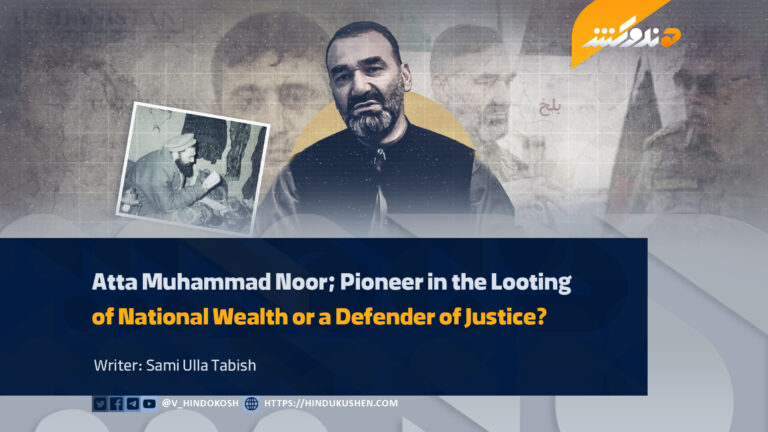Writer: Sami Ulla Tabish
The name of Atta Muhammad Noor, like other warlords, is intertwined in the political landscape of the past two decades in Afghanistan, not with service and honesty, but with domination, widespread corruption, the usurpation of national assets, and betrayal of the sacred ideals of jihad.
Atta Muhammad Noor, who once stood in the ranks of the Mujahideen against the Soviet occupiers, changed his path towards power-seeking, wealth accumulation, and political maneuvering after the Mujahideen’s victory, and effectively became one of the influential warlords who used the name of jihad merely to legitimize himself.
Although after the rise of the Western puppet regime called “Republic,” Afghanistan seemingly fell under the shadow of a central government, in reality, the feudal system remained intact.
In many regions, real power was in the hands of warlords who ruled over the people like local princes; among them was the province of Balkh, which was one of the most prominent examples of the feudal system of that time and had been under the heavy shadow of Atta Muhammad Noor’s authority for years.
The province of Balkh and its suffering people were under the direct captivity of Atta Mohammad Noor from 2004 to 2017; years filled with pressure, oppression, and plundering of public assets, to the extent that even the central government dared not remove him.
During this period, all the security, economic, political, and social structures of this province were organized in such a way that decision-making was carried out solely by a limited circle loyal to him.
The police command, the National Security Directorate, the Hairatan Customs Management, and even the city administrations were directly overseen by Noor or his relatives and party members; an abnormal situation that led to the establishment of a system resembling a dictatorship, with no effective oversight from the central government or judicial institutions.
Harsh reactions of opponents, suppression of the media, and threats against civil activists opposing Noor were other characteristics of his governorship; the statements of Shamsuddin Shams, a well-known trader from Balkh, are the strongest evidence of this claim, as he had his lands confiscated and was imprisoned several times after criticizing Noor’s policies.
Mohammad Asif Momand, a former member of the provincial council, was also arrested and tortured by Noor’s armed men after exposing widespread corruption at the Hairatan customs; an incident that later revealed Noor’s private prisons in various parts of Balkh.
Economic corruption is one of Noor’s most prominent betrayals toward the people of this land. According to a report by the Afghanistan Research and Evaluation Unit (AREU), more than 330,000 jeribs of land in Balkh have been seized, a significant portion of which belongs to circles close to Atta Mohammad Noor.
In the construction projects like “Kabul Plaza” and “Khalid Bin Walid,” government lands were transferred to companies in which Noor either had a stake or his family members were involved, and in the trade sector, transportation, oil import, telecommunications, and construction companies were fully under Noor’s control.
In an interview, he admitted that he owns more than 20 major companies in Afghanistan; meanwhile, most independent investors in Balkh faced political pressure and extortion, and if they opposed the decisions of the Noor circle, they would be threatened or eliminated.
Another point worth considering is Noor’s effort to rebuild his image and erase the stains of disgrace that have remained on his forehead as a result of years of bullying, corruption, and betrayal of the jihadist ideals; so much so that in the years following the fall of the Republic government, since he lost his power base, he has made great efforts to deceive the people of this land with justice-seeking slogans and false claims.
Atta Mohammad Noor, who himself is mired in corruption, has now appeared as a “critic of the Taliban” and speaks of “justice” and “people’s rights”—words that held no meaning for him during his rule over Balkh province.
Indeed, with a little reflection on his reign, we will find that he not only failed to establish justice but also established a network of corruption, usurpation, repression, and tyranny in Balkh using military and political power; a network that not only devoured public assets for his own benefit and that of his close associates but also silenced the voice of every critic and opponent through force and intimidation.
Note: The articles, essays, and comments published by the Voice of Hindukush only reflect the views of the authors & writers and do not necessarily represent the agreement of the Voice of Hindukush.




